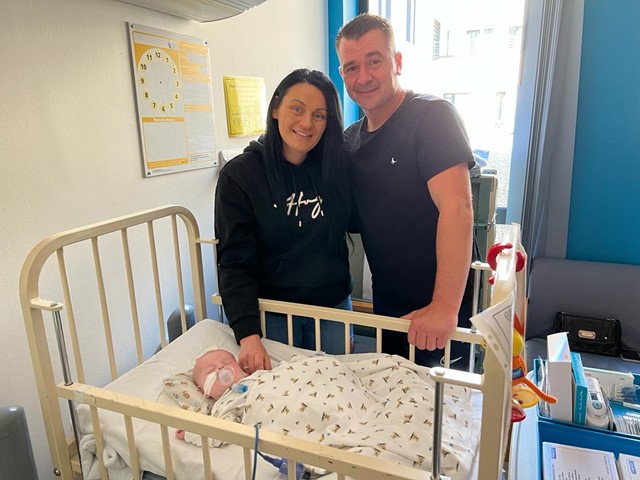Quick-thinking actions of expert clinicians at Royal Stoke save baby's life

A tiny baby born with unexpected severe breathing difficulties at University Hospitals of North Midlands is now thriving thanks to the quick thinking life-saving actions of expert clinicians at Royal Stoke University Hospital.
Alexander O’Flaherty was born full-term on 19 June with a rare abnormality of the airway called a laryngeal web, meaning that tissue was blocking the airway with less than a 1 mm gap. Due to the tiny airway Neonatal consultants were unable to pass a breathing tube to help him breath and called for additional support from paediatric anaesthetic and Ear Nose and Throat (ENT) colleagues to help fit an airway.
Dr Lee Abbott, Clinical Lead for Neonatal Services, explained: “We stabilised Alexander on the neonatal unit while requesting support from our paediatric anaesthetic and ENT colleagues. Both teams came very promptly and decided that an airway inspection needed to occur under anaesthetic. Due to the life threatening nature of the situation, rapid collaborations between maternity, our theatre team, ENT team and paediatric anaesthetic team resulted in a large number of staff and equipment gravitating to one of maternity theatres, which was essentially converted into an emergency paediatric ENT theatre and the risky examination was undertook safely.”
He added that baby Alexander had a lifesaving tracheostomy and without the prompt unique expertise available at Staffordshire Children’s Hospital may not have survived.
“University Hospitals of North Midlands is the only Trust in the West Midlands with the onsite expertise to have undertaken this procedure as an emergency on a newborn in the same hospital. Without the expertise, but more importantly the excellent team and collaborative working, this baby risked a life threatening transfer to Birmingham Children’s Hospital and may not have survived,” Dr Lee said.
Today mum Danielle O’Flaherty, of Heathfield Road, Uttoxeter, said: “We had been advised from my antenatal scans that Alexander had a congenital heart defect called Tetralogy of Fallot. We were prepared that he might need a short admission for observation after being born but we’d then be able to go home and have scans and surgery at Birmingham Children’s’ Hospital once he was 3 months old.
“No other problems had been detected and he was born perfectly so when he was struggling to breath everyone stepped in so quickly. I don’t remember much because I was also taken to theatre to remove my placenta but the webbing was explained and that the tracheostomy was the only option.”
Alexander has now been at Staffordshire Children’s Hospital at Royal Stoke for five weeks and is recovering well. Danielle added: “Everyone has been just fantastic, they have been amazing and we know very well that the outcome could have been very different. We are very lucky and incredibly grateful for the care Alexander and I have received.”
Danielle and her partner Aaron Groombridge have four other children between them and are now looking forward to having everyone back home together.
“Alexander will need the tracheostomy until he is about one so both Aaron and I are being trained how to change his tube at home and then we hope to go home. Once the trachy is removed he will need an operation to fix his windpipe and then hopefully be strong enough to have his heart operation. We still have a long way to go but he is doing so well,” Danielle said.
Dr Lee said: “Alexander is on minimal support and will go home with his tracheostomy and his parents are being trained for this. He will keep this until about a year of age, when he will have to have a complex tracheal (windpipe) reconstruction operation at Birmingham Children’s Hospital and his heart operation.”
